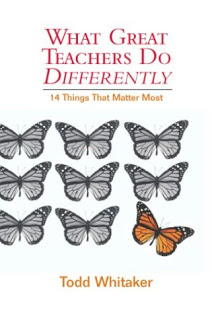
I’d had my eye on this title for awhile, and when I spotted it in the exhibition hall at the ASCD conference, I couldn’t leave without it. I explained my intentions to read the book and blog about it to the publisher reps, and Eye on Education kindly gave me a review copy.
Personal efficacy has been a major theme with me lately, and I’ve been devouring any resources I can get my hands on. So what makes author Todd Whitaker an expert? He’s a former teacher and principal who now works with over 50 schools a year as a consultant, and he’s participated in five research studies on the effectiveness of school principals. He knows great teaching, and he knows that great teaching is not about knowing. It’s about who we are, and what we do. This book is not about presenting a cookie-cutter approach to success, but, in Todd’s own words, “shows the framework that sustains the work of all great educators.”
This was an incredibly readable book that I finished cover-to-cover on a short flight from Richmond to New York. Whitaker gets right to the heart of the matter, breaking down 14 qualities of effective teachers in a manner that is at once knowledgeable and relatable. He makes a number of insightful points that really resonated with me:
When a student misbehaves, the great teacher has one goal: to keep that behavior from happening again. The least effective teacher often has a different goal: revenge.
He notes that an effective teacher only pulls from his bags of tricks a few times a day, but less effective teachers are constantly reaching desperately for something that works, and when that happens enough times, the teacher is “bound to pull out something ugly”.
Whitaker decries the assumption that great teachers are the ones who have high expectations for students:
Even the worst teachers have high expectations for students. They expect students to be engaged no matter how irrelevant the material is. They expect students to pay attention no matter how boring and repetitious their classes are. They expect students to be well behaved no matter how the teacher treats them. Now those are high expectations.
What really matters, Whitaker argues, is the expectations teachers have for themselves. He notes the importance of focusing on the one thing the teacher can control–his or her own performance. Great teachers filter out the negative and focus on the positive. They work hard to create a comfortable and supportive learning environment, and actively seek to repair damaged relationships.
And great teachers focus on real student learning and keep standardized testing in perspective–no excuses about the mandates from on high. Whitaker suggests teachers ask themselves:
What determines what happens in my classroom–the syllabus or the students? Do I hold up the standards at the finish line and watch the students make their way down the track as best they can–or am I at their sides, helping them develop the skills they need? Great teachers know the difference.
A few critics have dismissed What Great Teachers Do Differently: 14 Things That Matter Most as lacking practicality. I attribute that to the tendency in education to look to another program, another quick fix…that search for one miracle quality we can instill in all teachers to make them great, as if teachers were robots to be programmed. But Todd Whitaker understands that great teaching is about forming great relationships. Effective teachers understand that people, not programs, are what ensures success. As Whitaker concludes,
If everyone in a school is treated with respect and dignity, you may have nothing special. However, if everyone in a school is not treated with respect and dignity, you will never have anything special. Of that I am sure.

Angela Watson
Founder and Writer
Sign up to get new Truth for Teachers articles in your inbox
Discussion
Leave a Reply
OR

Join our
community
of educators
If you are a teacher who is interested in contributing to the Truth for Teachers website, please click here for more information.
















Smallest Twine: Yes, it’s definitely a great resource on teacher professionalism. I think you’ll get a lot out of it.
ATeachingHeart: I’m not sure who first said ‘it’s about people, not programs’…somehow that got in my head a few weeks ago and stuck! Whitaker definitely subscribes to that philosophy.
Teaching’: You’re welcome! Thanks for commenting.
Anonymous: I’d be interested to see what you get out of the book the second time around…
Joan: You are so welcome. Building relationships is what it’s all about.
Vanessa: I felt the same way: the book just resonated as being true. And most required reads DON’T (at least in your experience, and mine).
MsReagan: You’re a voracious reader! Between the books, the blogs, and Twitter, you must be an amazing teacher. 😉
SiobhanCurious: Do take another look at the book, and let me know what you think this time around. I agree the book is not a step-by-step practical guide, and the reader is definitely left to determine for him/herself how to implement the qualities of greatness. But I kind of liked that–you get to discover for yourself what works with your teaching style and situation. Maybe a practical guide could be a sequel…some sort of elaboration on HOW to achieve those qualities…
Amber: I definitely think you’ll find the book inspirational. It puts into words the things you are already doing, and encourages you to do those things that you’re not.
Anonymous: It’s a quick read–definitely pull it out when you’re laying by the pool this summer!
I must read this book! I am going to the book store tonight…
Chris: Great! Let me know what you think. 🙂
Wow!!! thank u very much for all this information. Keep on supplying such useful information. It really is interesting.
would love some comments on how you actually put some of these things to practice in your classrooms!